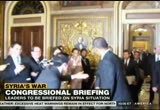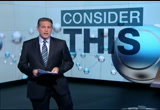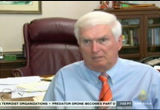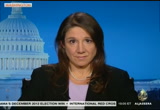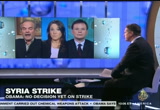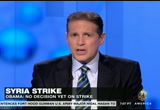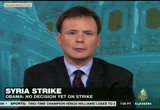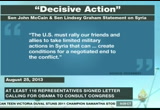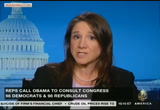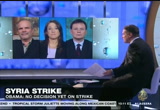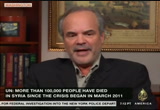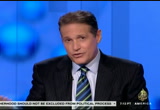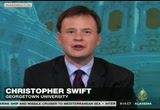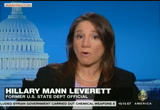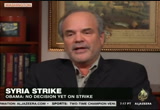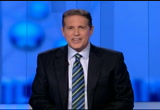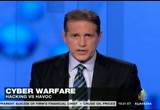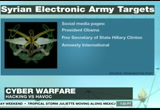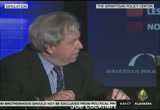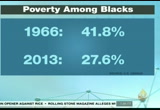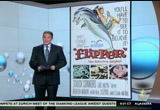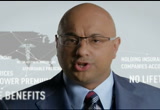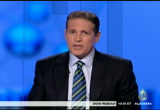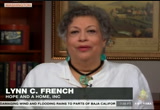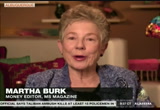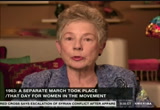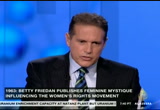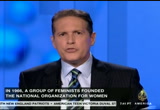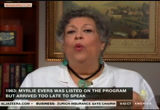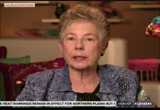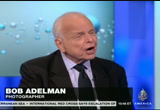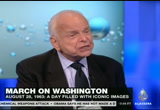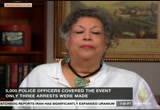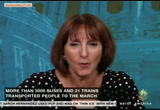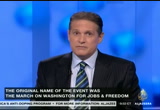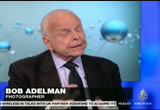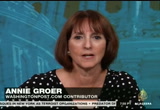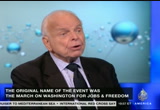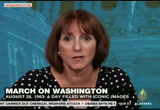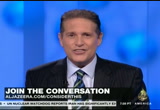tv Consider This Al Jazeera August 29, 2013 10:00am-11:01am EDT
10:00 am
♪ theme >> welcome to aljazeera, i'm richelle care. the british government says that legal conditions have been met for taking action against syria for launching a chemical weapons attack against its people last week. mean time, the german government said the russian president agreed that the united nations must deal with the situation in jair. the obama administration will brief congress today on the chemical attacks. anticipation is growing over whether the president will decide to launch an attack. yesterday, obama told pbs the united can take a stance against syria that does not result in a
10:01 am
drawn out conflict. >> fast food workers are expected to walk off the job today. the average worker makes $15,000 a year. they ever demanding to double that. >> a predator drone is the latest tool to help get a handle on that wildfire burning in yosemite national park. more than 4,000 workers are fighting the fire. it's been spreading for two weeks, consuming 300 square miles. six firefighters have been injured. it's about 30% contained. thanks for watching aljazeera, i'm richelle carey in new york. stay tuned for "consider this."
10:03 am
10:04 am
economic reforms, but members of syria's old guards steered him towards more authoritarian policies, and reresponded with a brutal crack down when syrians demanded change. he said he is not oppressing his people, but fighting militants. he calls them terrorists who must be struck be an iron fist. as the clashes continued the guardian revealed a more private side. the president showed a flippant attitude towards reforms he had promised to resolve the crisis, and centered this clip from america's got talent, while she shopped online for pricey jewelry and furniture. the president has assisted he has had popular support. he says he is trying to protect his country and his people.
10:05 am
but critics say he only wants to protect his own power. >> so how did he go from a westernized eye doctor to becoming the president of syria using chemical weapons to massacre his own people. i appreciate you both being here. you interbothed bashar and his father -- >> yes, i did. >> what is your impression of this man? >> i interviewed him very early in his term as president. and he was an unknown. whereas his father had been really ruthless, but he was tough, ruthless, clever, and the
10:06 am
son was an unknown quantity. >> despite his western leanings because he had been in london for so long -- >> yes, and i think there were some hopes that syria could be broken off from iran at that point, strategically. >> and ed this is not a guy who resembled your saddam hussein and gadhafis. how he has turned out to be very similar to those guys. >> he inherited a legacy from his father, and that background was always there, and he was surrounded by his father's strong men. he was torn between two worlds, one with the british wife, him being english speaking, enthralled by the internet and wanting to connect syria to the rest of the world, and then he had his father's old military commanders around him who said no, no, no. you need strong men and we will
10:07 am
look after you and your interests and your brother and sisters. you do the economic stuff. the internet, the tourism and we will look at the country. so military were the same as they were before. >> to your point, the author of the fall of the house of assad, points out when he first became president, things were thought to be different. say. >> he was seen to be the hope -- he was called the hope in syria, that he would bring reform and change the system, and he was very popular for a good amount of time in syria, and it was pretty genuine. >> as you both said there was optimism, so how did he change? we heard ed's description of the
10:08 am
kaball around him influencing him, but he could have made different choices. >> i think what has hand now is russia has really stepped into the game and iraq. they are far more important that assad, although assad certainly wants to hold on to power. when our secretary of state went to meet with the russians, he proposed a geneva conference five minutes later the russians were promising to send in long-range missiles, and hezbollah came in from lebanon. and all of a sudden when russia stepped in and iran stepped in more heavily, the balance of power swung to -- back to assad, who everybody in the u.s. thought it was just a matter of
10:09 am
time before he left. >> did the u.s. underestimate power? >> not only his determination and also his appeal among syrians. when i lived in syrian between 2003 and 2006, assad was popular, and continues to remain popular inside syria. syrians are increasingly faced between an al qaeda dominated opposition, and a dictator who has delivered stability up until the recent uprisings. so that remains still the position among many syrians however detestable it is to us. >> because of the demographics in syria too, there are many people who areal -- allied with assad and would suffer if we loses power. >> there are some people. but i would say there are a
10:10 am
great number of people who are opposed to assad. many people are dying because of assad. and now he has stepped over the plate and used as secretary kerry said this morning, he has used chemical weapons. >> but the difference is that other dictators were not able to circumstances. >> they weren't. but unlike libya, yemen, and egypt, in syria we have not scene huge uprising in the major cities. and outside the major mosques on fridays in the way we saw in egypt, because -- for whatever explanation, there is still support -- people are still going to work. salaries are still being paid. pensions are still being paid. and inside damascus there isn't that feeling they are at war. >> and he actually used to live
10:11 am
a fairly free and kind of westernized lifestyle. in fact last year the guardian in england got access to some of his and his wife's internet records, and some of the stuff reminds you of the bialty of evil. they spent thousands on the internet and all sorts of luxury items. designer goods. swapping entertainment links, including magicians from "america's got talent" in their emails. downloading country music from the united states. he has an instagram account where the pictures all show him surrounded by loving people -- >> but this is not true. >> of course. if you look at his instagram account, it would seem that syria. >> yeah. i think ed has a point there.
10:12 am
the aloids who are only 11% of the syrian people, of course they are going to hang with him or they will be dead. in syria, tremendous strife is going on with the opposition group. i think it's a really serious opposition, and i really don't agree it's going on. and people are dying. they have very poor arms. obama's has promised to send in arms, but apparently they haven't been delivered. >> the more strongly armed rebels seem to be aligned with al qaeda. >> correct. and the syrian opposition has been disunited. >> in the spring he talked about using any means necessary to win. >> translator: if what is required is an exit from a national crisis, then there are no exceptions to any means that may help us exit this crisis. >> clearly was signalling that he was willing to do pretty much
10:13 am
anything, but are you surprised he has gone this far given the circumstances and the red line obama? >> i'm a contraryian of him using chemical weapons. he has killed 70,000 civils, slaughtered 30,000 soldiers. >> so you don't think he did? >> i'm not convinced he did, because the motivations don't seem clear at this late stage in the conflict, where he is not losing, why would he risk this? >> that's a good question. he was winning the war by all accounts. >> i think that's a slight overstatement. i think syria is broken up into three parts, one controlled by the opposition, and one
10:14 am
controlled by russia and the iranians. in the end you will have a broken up state. assad will not control as we once did ever again. i think he did use chemical weapons. i don't think the u.s. intelligence is make it up, and medicine frontier said they treated 3600 people. >> you are not arguing whether chemical weapons were used, you them. >> his brother may have used them. al qaeda used chemical weapons in iraq in 2007. in may of this year, syrian rebels used chemical weapons. chemical weapons have been used, we're not sure yet who used them. now it's important not to override the fact here and get caught up by the emotion of drum beats -- >> do you think his brother
10:15 am
could have used them? >> no, i think that's ridiculous. i think the regime used them, and i don't think there is any doubt about it. >> why would they use them when they are not losing? when they have killed 100,000 people without them. >> i think they are very confident and they think obama is weak. and so far they have been proven correct. so i think there's not a doubt in the world, and when the un inspectors get there, they are not going to find anything, because they bombed the place. that. >> let's switch gears, and focus on the assad family. his wife ten years his junior. her card was a prominent cardiologist in london, or still is. she grew up there.
10:16 am
and worked for jpmorgan in new york city as a banker. you saw them in their existence -- both of you did, in -- in syria. how do -- does a young new york banker turn out to be a very powerful first lady who by all accounts is very influential over her husband and very much supporting who is going on. >> beats me. the person i have interviewed that knows the most about ah said is the prime minister of turkey. they were extremely close. and i asked him i said do you think he will go down with the ship or will he cut and run? i mean what kind of guy is he? and he basically indicated that he thought at some point if he thought it was hopeless he would get out. so far the prime minister who is
10:17 am
very smart has been proven wrong. >> and he has pulled away from the relationship. >> oh, they hate each other. wife? >> she is a very strong character. she was seen as his bridge to the west. her father as you mentioned was someone who mobilized lots of british and european politicians to visit damascus on a regular basis and act as a bridge to whitewash the regime and give it great international respectability. but she was also seen adz the head of various women's organizations inside the country. he was seen as patron, and given them -- >> the sunni majority. >> a sunni majority state. so she had an important roll to play. but a year and a half ago there were real rumors where she was born and raised of imminent divorce between her and him and
10:18 am
she was flying back with their three children. that never materialized. so there were real concerns about tension in that marriage. because she did not want to be a witness to all of this. but then some of the emails indicate that she was the one poking fun at notions of democracy. >> right. you talked earlier about this bubble that he is in, or the popularity within syria. we found a poll -- a pew poll from march, and what is interesting about this poll, is just how unpopular he is outside of syria. in fact the only people outside of syria, and the majority who support him are the shiite in lebanon. even in russia he is not popular. the numbers in russia are
10:20 am
other big changes they've taken away pre-registration period from folks before the voting, an also short ened th the early voting time, and for folks just under 18 they've taken away pre-voting registration as well. there are some 300 people here today. and they feel that it >> what are the laws going to begin to take effect?
10:21 am
>> reporter: the laws do not go >> as the cries in syria plays out, rogue hackers have been busy with cyber attacks on the u.s. if you tried to go to "the new york times" website tuesday to get the latest on syria, you would have been directed to the syrian electric army instead manufacture it has been restored, but twitter accounts and even president obama's social media has been sit since the war in syria began. while it has been a nuisance, the threat of a major cyber attack on critical american infrastructure is a growing concern and clearly on the mind of janet napolitano. >> our country will for example at some point face a major sign are event that will have a serious event on our lives, the economy and the every day funking of our society. more must be done quickly.
10:22 am
>> joining me now to talk about the implication of cyber attacks and the threats we might face is a former hacker. he is now a director investigating threats and vulnerabilities. thanks for joining us. the basic question, let's start with the syrian electronic army. who are these guys and are they just a nuisance? so far, they've been attacking these social media sites, but have caused harm. in one case a few months ago, they put out a tweet that talked about explosion at the white house and it caused the stock market to plunge 150 points. even in their nuisance way, they've caused harm already. >> yeah, what we do know so far about them is that apparently, they are young people, a hacker group based of young people in syria, but probably there are more people in other middle east countries that are helping them.
10:23 am
they have been active pretty much for the last few years, so they have started doing these hacks in 2011, and they started attacking israel websites, so then they migrated once the syria conflict started, they migrate to attacking western media companies, including the new york time yesterday and also washington post and as you said, a lot of social media and other important media in the western world -- >> it's getting worse. the problem is that they are not even that sophisticated, i mean, in fact, we saw how -- we know that some of them are what we call -- they do not launch complex attacks, but those attacks are out there launching
10:24 am
and working. that's my big concern now. >> we've heard for years that cyber attacks could take out power grids, financial markets, banks and officials have done drills and simulated attacks. we're going to show you one called cyber shock wave, produced by the bipartisan policy center, including a whole officials. >> the country's internet system is now slowing down to a virtual crawl. communications with financial trading houses are almost at a stand still. >> it is an active war. you turn off everybody's cell phone, you don't allow them to bank, work, communicate be this is an attack on the united states. it may not be a bomb, but it's much more significant than a bomb going off. >> scary simulation there. what systems are in place. what's the danger of that kind of scenario. >> ok. i know we have been spending billions of dollars protecting
10:25 am
this kind of infrastructures, so i'm not very worried about critical infrastructures being attacked. they are being attacked every single day, but i think they are well protected. in fact, if we talk about things like the nuclear plants, we have systems in place, what we call air gaps. it means that those systems are not connected to the internet. we have big separation between internal networks and the internet. even if you want to attack those kind of critical infrastructures, you have to have physical access to those installations. i think it's not that big problem right now. i would say that the big problem right now, it's cyber espionage, that the companies with private information or intellectual property. that's my big concern now. >> obviously a big problem. why then do at some very high
10:26 am
american officials said that they believe that poor internet security has now become a bigger threat to the united states than global terrorism. >> yeah, and i completely agree, but once again, i think that the physical damage is not going to happen, at least in the next few years, because we have spent a huge amount of money on protecting those infrastructures, and as i said, stealing information is much more easier than actually performing real damage. >> the head of national intelligence james clapper agrees with you, thinking it's only a remote chance of some sort of widespread attack that would cause some sort of regional outages, but you've got china employing thousands of engineers, a hole army targeting both cyber he is meanage and other ways, going after fortune 100 companies, russia and iran also in that business, china,
10:27 am
the most active aggressors, china the one we really have to worry about? >> i think we have to worry about every single country out there, and every single not only countries and governments, but also individuals, and groups of hackers that are stealing information and selling that information to governments, because most of the times when we talk about cyber espionage, there is no government behind that, but it's like willful hackers stealing confidential data and information from western companies and then selling that information to governments. of course, and governments, such as china as you mentioned, and even russia and we have seen cases in iran and north korea, they have these capabilities inside their armies, but the problem right now are the groups selling the private information and confidential information. >> i hope you and james clapper
10:28 am
10:30 am
>> tonight's data difficult looks at however america has come since the march on washington in 1963. we looked at numbers provided by the u.s. senses, population, in 1963, the total estimated number was 20,200,000. 2012, that 14 doubled to 44.5 million. on to the economy. these numbers are adjusted for inflation. the medium in come for black families in 1963 was $23,300. in 2010, that jumped to $40,500. the poverty rate for blacks first measured in 1966 was at 41.8%. today, it's down to 27.6%. still a major problem. but education is much improved. in 1964, there
10:31 am
were 234,000 black undergraduate students in america. the numbers shot up to 2.6 million, more than 10 times the amount. more good news, the rate of blacks aged 25 and over who completed four years of high school tripled from 25 perfects to more than 85%. >> in 1963, there were five black members of congress and no senators. in 2013, there are 43 black members of congress and one senator, a lot of room left for improvement in the upper chamber. >> you can look to the movies for encouragement. flipper was the number one film on august 281963. this year, it's lee daniels, the butler, which just happens to be about america's civil rights movement. >> coming up, what was the rolling of women in the civil rights movement and 1963's march on washington and were they
10:32 am
[[voiceover]] every sunday night, al jazeera america presents gripping films from the world's top documentary directors. >>thank god i didn't suffer what he had to go through. next sunday, the premiere of google and the world brain. >>this is the opportunity of our generation. [[voiceover]] it would be the world's greatest library under one digital roof. but at what cost? >>google could hold the whole world hostage. [[voiceover]] al jazeera america presents google and the world brain. can you say stocktopussy?
10:33 am
this is the 900-page document we call obamacare. it could change costs, coverage, and pretty much all of healthcare in america. my show sorts this all out. in fact, my staff has read the entire thing. which is probably more than what most members of congress can claim. we'll separate politics from policy, and just
10:34 am
prescribe the facts. inside of it. >> i have a dream that one day this nation will rise up, live out the true meaning of its creed. we hold these truths to be self evident that all men are created equal. >> as we commemorate the 50t 50th anniversary of martin luther king's inspirational speech, what he said was all men are created equal. he was echoing the declaration of independence but did he speak to the way women were viewed and valued?
10:35 am
joining us to discuss this are two women who were at the march, lynn french, adjunct professor of history of civil rights, and executive director of hope and home, also from washington, d.c. annie grower, a contributor to the see the people blog on the washington post website and martha burke, the money editor of ms. magazine and producer and host of "equal time with martha burke." you look too young to have been there. lynn, i want to ask you what did being there on that important day 50 years ago mean to you as an african-american woman? >> on that day 50 years ago, it was just the most amazing experience i'd ever had in my 16 years. you have to look at it in retrospect, we sometimes see things that you didn't see then, and you have to remember that at the point the people
10:36 am
converged on washington, we as a community were off of a very hard fought battle in birmingham, in albany george. >>, in mississippi, in alabama, people were struggling to have the right to citizenship, the right to vote, the right to public accommodations. people were being jailed and this was a culmination of those efforts to come to washington and petition the federal government to intervene and insure that in fact all citizens have equal treatment. >> annie, you were there, too, 50 years ago. again, you were there today for the march today. how did being there in 1963 impact who you became no. life. i was 17, and i had a summer job. i was on my way to college and i realized that there were people all over the country who i was aworking class examined kid of immigrant parents but still had this genetic advantage and
10:37 am
needed to go down and say i'm standing with everyone else, because it was so important. i went into college thinking i would be a high school english teacher and i said no, i needed to go into journalism to stand up, bear witness and maybe make a difference. >> martha, you've written about the ways in which the women were at times overlooked. there was only one woman on the dais that day. why was it? >> well, certainly with the march, the woman who did not get her proper due was dr. dorothy hite, one of main planners of the march. she was the one woman and they used to crop her out of the pictures, until she learned to stand in the middle where they couldn't crop her out. she made her case as strongly as possible to have a female speaker on the podium that day, have a female speaker, and they
10:38 am
refused. the men all said no, the men are going to do this, and after the march, president kennedy invited the organizers to come to the white house. if you looked at the pictures today on t.v. of all the men with kennedy, they told the women you can't come, go back to your hotels, and that included coretta scott king, king's wife. >> you feel she was marginalized in the years after the march? >> in the years after the march, after he was assassinated, the male movement leaders at that time came to her and they said we know you're planning on opening the martin luther king center in atlanta, which exists today as the most complete archive of the civil rights movement. we know you're going to open this, but you really need to step aside and they use those words, step aside and let us run it. of course she refused. she said no, i am coretta scott
10:39 am
king, i am not going to step aside, but they certainly did pressure her to do that. >> lin, you are not on the aim page. >> there is no mention of her on the king memorial to this day, and martin luther king said hands, the statute do not show his wedding ring, which he very often wore. >> lin, you think that women weren't quite as marginalized as that? >> i guess my opinion is that at this point, we were struggling for rights for all african-americans, we called ourselves negroes then. the women's issue is an issue that gained 1964 civil rights act that came the next year after that included women and women became -- got legal recognition of the rights for equality. i'm not saying that women didn't have those rights before then,
10:40 am
but i almost think that it's a mistake to view historical actions by future standards. i just don't agree that criticism of the civil rights movement, that because there were african-american men there that day, and no women speaking that women were just being ignored. >> and looking back, some authors have said that women were the backbone of that civil rights movement. annie, do you think that the issues that were being fought for at the time included enough of the ires that faced women or at that point was the civil rights issue the one that completely dominated the civil -- the issue of segregation and jobs and everything else that african-americans were suffering back then? >> i think all of those issues impacted women as well as men, but i have to agree with lin
10:41 am
that if you look back in those days, and the same thing happened several years later in the anti war movement, it was a very heavily male movement. i think women only got their voice as a woman's movement developed, but at the civil rights march, i believe that it really was that sort of the push forward for all african-americans, and no question that it was totally ignoring women out there was totally appalling, but i think that that we really are in some ways overlaying what we think of today back then. >> lynn, do you ever feel a pull between or a need to prioritize between the importance of being a woman versus the importance of being an african-american? >> i'm an african-american woman and each is an important issue to me. at that time in 1963, the barriers that were presented
10:42 am
before me were because i was an african-american in a segregated city. i also know that part of my history as an african-american is that women within my culture were not cavity aside. if it weren't for rosa parks or ella baker, or countless other women, there wouldn't have been a movement, and i don't believe that any of them were looked down upon. it's just that dr. king was dr. king. he was the person who grabbed the microphone and was. he's the one who galvanized the larger movement. i really think that it's a mistake, perhaps in other communities, where the men have not been oppressed, maybe it's seen as more important to say that in 1963, women should have been there than it would be for someone from a community where you just couldn't go to the same schools, you couldn't ride the
10:43 am
same buses, you were getting thrown in jail, beaten, fire hoses, police dogs, the whole nine yards, not because you were a woman, but because you were what we would then say negro. >> we have questions coming in from viewers. i would like to get to hermela. >> our viewer says women are still getting paid less than men and also not getting higher positions. why hasn't anything changed? >> well, that is right, the pay gap has not changed in 10 years, and african-american women are certainly paid less than white women today as they were back in 1963. the pay gap is still very large between women and men overall. i want to go back to something that was said earlier, because what i am saying came straight from dr. door
10:44 am
3hite, from coretta scott king, it is not my personal opinion, it is what i was told personally by the people that were during, by dorothy hite who worked right alongside the men. she said when it came time to the recognition, they left me out, they left me out of the march recognition, they left women out in general. women did do a lot of work in the movement, but they did not get recognized for it, and she told me, she said that is what gave rise to the women's movement in the african-american community, the women were ignored. >> i wanted to go there. whatever the role of women and recognition was back in 1963, how, martha, did the work that was done in the civil rights movement impact then the women's movement that followed? >> well, it gave rise to it, essentially, because even in the white community, the anti war
10:45 am
community, the civil rights movement overall, women were still treated like honey, go get the coffee, and they will tell you that, and they have said that all these years, yes, women were the backbone of the movement. i don't dispute that at all. all i'm saying is they did not get the credit they deserved. they don't get the credit today. if you go out in the street and ask people about women in the civil rights movement, they're going to name rosa parks and maybe fanny lou hamer, one or two others maybe, but they can yet name many men, because the men were front and center. i'm sorry that that's the way it was, but that is history. >> all right, well thank you for joining us, martha, and knee and lynn are going to be back after the break and we are going to
10:46 am
10:47 am
10:48 am
they are out there and deserve to be examined. joining us to share powerful images from the march on washington, please welcome the photographer behind a beautiful new collection called i ever a dream, a 50th year testament to the march that changed america. we are joined from washington by lynn french, university of virginia adjunct professor who teaches civil rights and annie grower, a washington post contributor. i want to ask you, you chose on your own to cover the civil rights movement, you were a freelance photographer and covered it before the march on washington. was that one of the most special days of your life. >> yes, of course, but i was a volunteer and trying to break into magazines at that time, but i had no assignment. i just came there as a volunteer, and because, well, the -- it's hard to remember this, but the movement at that
10:49 am
time was a few hundred, maybe a few thousand people doing very specific and very often very dangerous things. the movement was confronting segregation, which sounds like the separation of the races, but it was really enforced by terror, and it was very dangerous work. i came there. we had a saying in the movement when the spirit says move, you move, so this was a great day, because we were protesting the fact, i mean, only weeks before, president kennedy had announced legislation, and he was the first president to ever say that segregation, which, you know, demeaned and was a violent system was wrong. no president in 100 years. >> i want to move on to see some of the picture, because they are beautiful and powerful images. >> thank you. >> i know you were floating
10:50 am
around and able to get a lot of different pictures than what you often see. the first one, we see martin luther king as he's beginning his speech. he was looking down at his papers. he started reading from a preordained script and then we just saw a picture of mahalia jackson. what's the story behind her importance to that speech that day? >> well, the story is that as with any movement, speeches evolve as a leader oh are a speaker goes around from place to place speaking and dr. king had been talking about this dream for a while, and i guess people had advised him to make this speech entirely different and not talk about the dream, and he hadrian different speech and he was into that speech and mahalia jackson, his favorite singer, turned to him and said martin, tell them about the
10:51 am
dream. and that's when he cut loose and started talking about it. >> i want to go back to those pictures if we can. you see the transition, you see exactly what happened. you see him serious looking at his paper there and then in just a moment after she called out to him and he started improvising and using that speech that he used before, you see him with almost a different level of energy and see him ending triumphantly. annie, what was going through your mind as you watched this unfold? >> remember, i was so far back, as this was unfolding, that a small gesture, leaning forward saying martin, remember the dream, was so lost on me, but whatever the spirit was that moved him, it was just really an electrifying moment. it was just excite extraordinary. >> bob, here's a picture you took of the congressional
10:52 am
delegation that was there, significant leaders important to the civil rights movement and congress and it was very important they be there. >> yes, of course, the whole purpose of the march was to get congress to pass legislation, and these congressman were on our side, but we also knew when so many people showed up, to say we were only to small band of people comparatively, when hundreds of thousands of people showed up, we all knew something was in the air and something might happen now. >> lynn, did that give you hope that those congressman would lead to legislation as they did? >> sure, but i was more moved by seeing a quarter million people than a few congressman. as a 16-year-old. i would imagine, though, that many politicians, once they took assessments of how many people
10:53 am
were there and how this whole event reverb rated throughout the country thought well maybe i need to give a positive vote only manner. >> let's look at another picture of another very important figure oh who was there. you photographed rosa parks that day. what was your impression of her? >> well, rosa parks was a great heroine. she appeared at every one of doc's events, and i photographed her at his funeral, and i must have taken maybe two or three rolls of film. that would be 60 or 80 photographs, and she was crying in every one of them. >> that is a beautiful picture of her.
10:54 am
now we have a picture of the one man who spoke in 1963 and spoke today, there is john lewis, looking very, very young. lynn, you've said that john lewis's speech was very important to you. >> it was. he was not much older than i, and just hearing him speak out in the spirit that i believed in of really stepping forward and agitating and making sure what was needed would happen, i think he spoke to the young people that day. >> i'm sorry, go ahead. >> brother lewis told me when i gave him that photo, he said that that's a scared rabbit. [ laughter ] >> he said that he was 22 and about to address the nation, and had just been through the mill, because his speech was very militant, and i mean, not that anybody disagreed with anything
10:55 am
he said, it was just that they -- we were there to try to persuade people, not to provoke them. >> tough to thing of june lewis as a scared rabbit under any circumstances. >> in fact, his speech was toned down. it was insisted that he tone it down. i think he had intended about marching through the south the way that sherman marched to the sea. >> non-violently. [ laughter ] >> i think that made the whole day so miraculous, because even this sort of toned down fire rye rhetoric, people were quiet, they were to answer fixed, there was had this sense that all was possible. you were standing in crowds of people you'd never laid eyes on. i'd never seen such a diverse humanity in my entire life. there was a kind of quiet amid the applause, there was this sense that oh, my god, something
10:56 am
may actually come out of this. >> let me show you a couple pictures that struck me as i was making my way through the book. this is with one calling for jobs how to. it was one where it was a gentleman who was there with his family. there it is, marriage club. it's actually there was an interracial marriage club of washington, which struck me. again, 50 years later, something like that seems like such a crazy thing, but that was the reality back then. >> it was illegal. >> it was illegal in many states, right. >> the supreme court a couple of years later i think made it legal. one of the, you know, talking about progress, one of the things that has changed enormously is interracial marriages. of all the indexes of change, that has gone through the roof. who knows exactly what the
10:57 am
reason is, but you can't have the people who dominate popular entertainment, and popular sports be predominantly african-american without an enormous increase in interracial marriage. >> one of the things in the picture and book is how many white faces you see in the crowd, which surprised me as i was looking through the pictures of the crowd is how much support there was there among whites. >> it was the original sin of american life, slavery and segregation, which was the way the south rewon the civil war. these were the last battles of the, you know, of the civil war that we were engaged in. >> we have some viewer questions. let's go to hermela. >> this question, do you feel different about yourself as an american for having participated in the march and what still
10:58 am
needs to change in the united states? >> i do feel different. i feel proud and i feel i had a sense of optimism. the headlines and news clips in those days were horrendous, and yet when i went to the march on saturday, and again today, and spoke to a lot of people, the takeaway was yes, we've made a great deal of progress, but we are not even close to being where we need to be. half a den people said to me over and over we're still fighting the voting rights act battle. how can that be? so i think that we just have to work harder at it. i think we've made progress, but we are not home yet. >> i want to leave you with one last picture. there's a big celebrity contingent today at the march, and there was also one back then. there we see ozzie davis, that's
10:59 am
joan baez, who sang back in 1963. marlon brown dough was there. charlton heston was there. there's sammy davis, jr., peter, paul and mary. they had an important part of that day. there's james baldwin, the author. we had a very strong presence of very famous people there that day and also today. i just wanted to show some of these pictures, bob, thank you for being here, the book is i have a dream, a 50 year testament to the march on america. i want to thank you for joining us tonight for this interesting discussion and celebration of the 50th anniversary of a very important day in american history. thank you. the show may be over, but the conversation continues on our website at aljazeera.com, facebook, our google plus pages or twitter. we'll see you for our next show.
11:00 am
103 Views
Uploaded by TV Archive on

 Live Music Archive
Live Music Archive Librivox Free Audio
Librivox Free Audio Metropolitan Museum
Metropolitan Museum Cleveland Museum of Art
Cleveland Museum of Art Internet Arcade
Internet Arcade Console Living Room
Console Living Room Books to Borrow
Books to Borrow Open Library
Open Library TV News
TV News Understanding 9/11
Understanding 9/11
